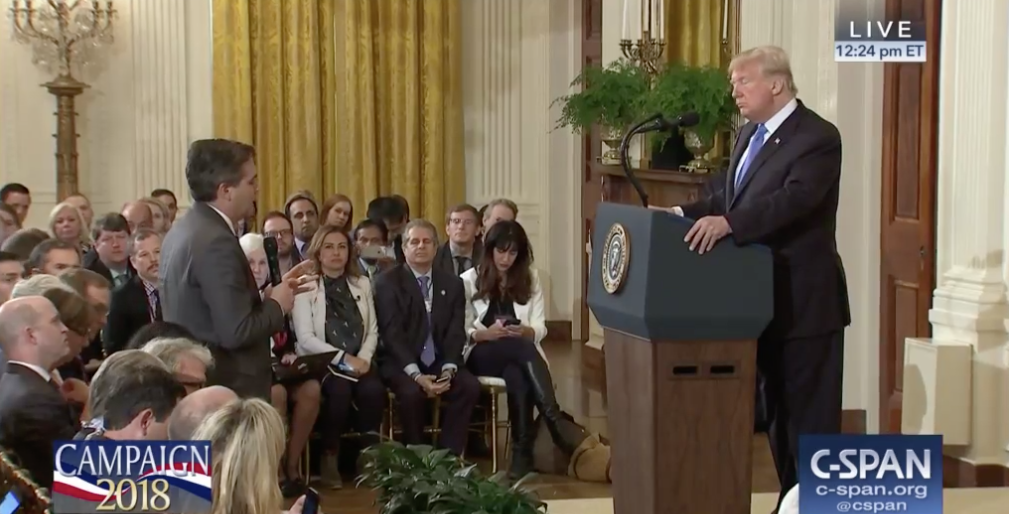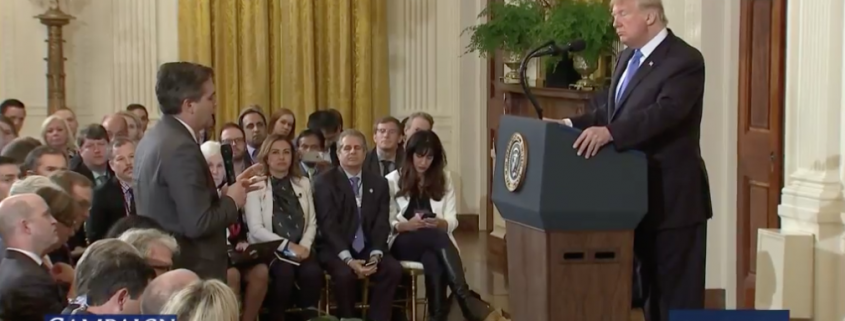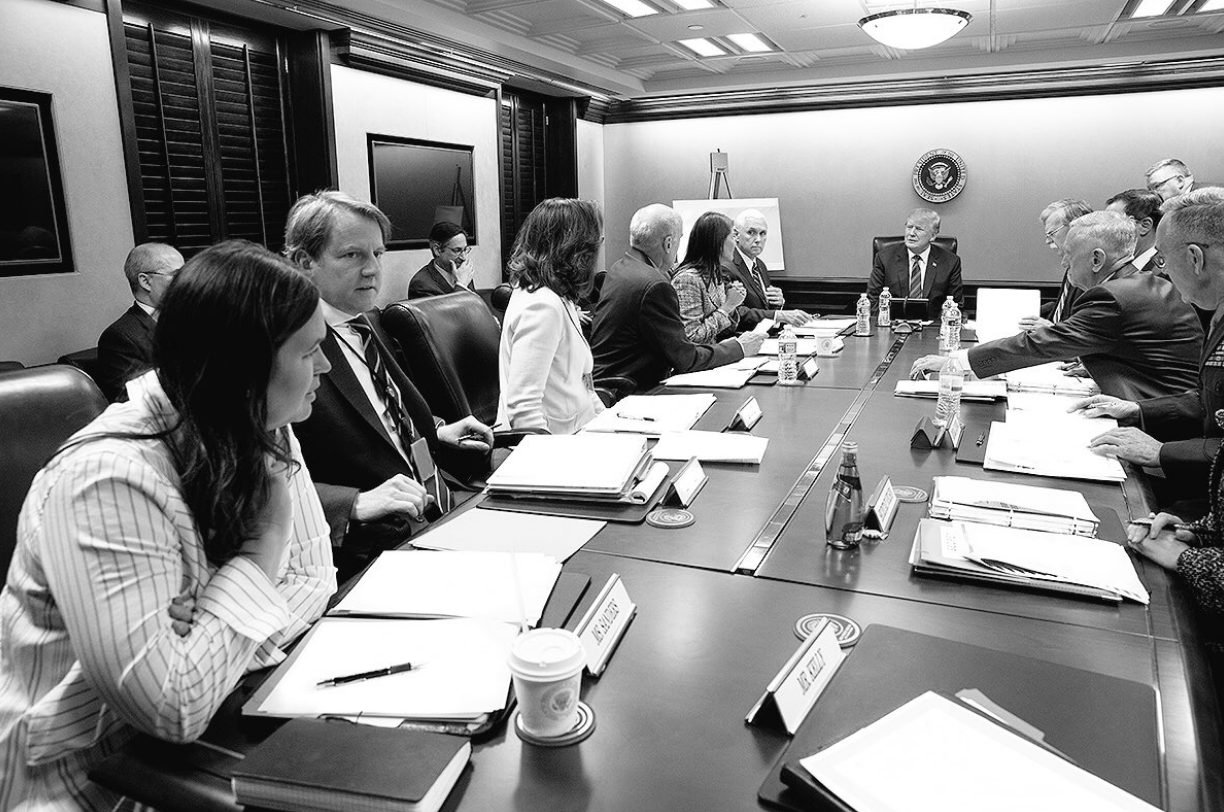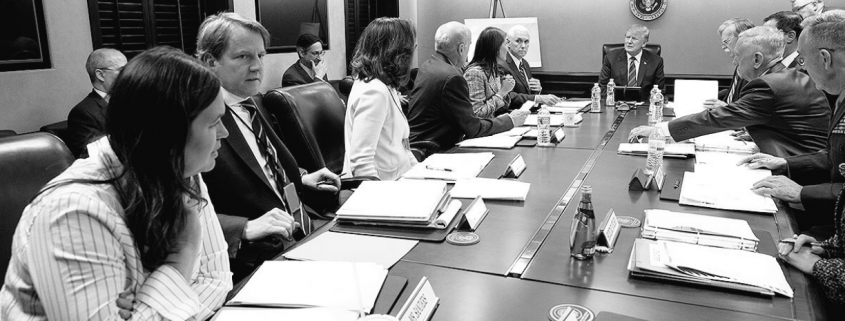CNN is suing Trump and the Secret Service for taking away Jim Acosta’s White House hard pass.
I’ve got mixed feelings about the lawsuit, both as a strategic choice and with regards to how it is argued.
From a strategic standpoint, I absolutely endorse challenging Trump’s abuses in courts, because they are a venue he has fared poorly in, in large part because he’s so legally incompetent in being abusive. And the law around credentialed access is actually pretty problematic. Having a big media journalist call attention to that may be useful. Better to have CNN pay to make this argument about Trump singling out disfavored members than … me!
But by suing Trump while continuing to treat his and Sarah Huckabee Sanders’ press conferences as legitimate news vehicles, you continue to validate the way Trump uses (and denigrates) the media as props in a pageant of tribalism. This lawsuit will actually provide Trump a way to magnify the opposition between him and CNN, to claim he is being attacked by a mean Fake News outlet, thus becoming one more prop in Trump’s performed conflict with the Fake News he uses to debase facts and truth.
Indeed, the lawsuit actually reinforces the claim these staged press conferences are legitimate press vehicle when it claims — as part of its First Amendment claim — that Acosta can’t do his job without hard pass credentials and CNN therefore is deprived of its White House correspondent without one.
Defendants have deprived Plaintiffs of their right to access the White House grounds by revoking Acosta’s White House credentials. Without those credentials, Acosta cannot access the White House and cannot effectively serve as a White House correspondent, thus depriving Plaintiff CNN of its chief White House correspondent
Obviously, CNN can (and has) covered the White House in the time since Trump pulled Acosta’s hard pass. It takes different kinds of reporting, and nowhere does this complaint convincingly argue that the live attendance at press conferences is necessary for them to report on the White House.
Because I think White House press conferences generally, and as practiced under Trump specifically, often serve more to perform journalism rather than conduct it, I think a boycott of White House press conferences would be a better response.
As to how CNN is arguing this. I’m not a lawyer, and definitely not a lawyer of the caliber of Ted Boutrous and Ted Olson (Olson’s inclusion is an especially nice touch both because it suggests CNN is willing to appeal this but also because, earlier this year, Trump tried repeatedly but unsuccessfully to hire Olson as part of his defense team).
But it bothers me that this complaint treats a White House hard pass as a right, rather than arguing that the revocation of a hard pass outside of normal process constitutes an abridgment of the press, one carried out outside the existing process for regulating access to the White House media space (which after all is a finite good). Under the current regime, no one has a right to a hard pass — I probably would be refused one (I even seem to have been bumped off part of the White House email list!). Yet CNN presumes that its necessity for a White House correspondent that (it says, unconvincingly) must have access to the White House media space means it must be given access to a hard pass.
A hard pass is essential for White House reporters because it provides access to areas designated for journalists in the West Wing, on Air Force One, and in other secured areas during presidential trips, which are routinely covered by the White House press corps. For a White House correspondent like Acosta, the White House, or wherever the President is travelling, is his workplace. Indeed, Acosta often writes and broadcasts directly from the White House, working out of a booth in the press area known as the “lower press room” or from the “upper press office,” in close proximity to the Oval Office and the offices of the Press Secretary. Because Acosta’s work requires his physical presence at the White House or on the road with the President, he often goes weeks or months without visiting CNN’s Washington bureau. Accordingly, the press credentials allowing access to the White House grounds and press complex, and to the President and his entourage during trips, are necessary to provide workplace access. Without this credential, a daily White House correspondent like Acosta effectively cannot do his or her job.
The first treatment of the alternative — a daily pass (which is what I’ve had the sole time I covered something at the White House) — is inadequate to the task of showing that the hard pass is a kind of access that the White House should not be able to subject to politics and whim, because it conflates the readiness of access with the arbitrariness under which such access is given.
Without a hard pass, a reporter must ask for advance approval each time he wishes to enter the White House. Such access often needs to be requested at least 24 hours in advance. Since many White House news events, briefings, or appearances are frequently announced day-of, reporters without a hard pass are often effectively unable to cover these events. Further, the White House may decline to admit a reporter requesting daily access. Even if admitted, the reporter must wait in a security line with the general public and be screened before entering the White House and then be escorted by security around the press offices. Without a hard pass, a White House correspondent simply cannot do his job.
The problem with the daily pass is that a journalist obtains one via a far more arbitrary process, giving the discretion for entrance to a White House political appointee who can exercise bias in a pernicious way, rather than the Secret Service. The fact that Acosta was denied a daily pass once already could be used to emphasize that.
The White House also rejected Acosta’s application for a day pass on November 8, 2018.
The details about the Secret Service denying Acosta access in Paris would also be better deployed in an argument about the abridgment of rights that other similarly situated (in Paris, accredited by France) media enjoyed, than in arguing about a right that he has been denied.
On November 9, 2018, Defendants prohibited Acosta from fully covering the President on a trip to Paris to mark the centennial of the end of the First World War. Although Acosta traveled to Paris, he was told that he would not be allowed to access the President’s events, including an event that had been planned (but was ultimately cancelled due to inclement weather) to visit with French President Emmanuel Macron a cemetery to honor the fallen. Although the French government issued credentials to Acosta, the Secret Service refused to allow Acosta to attend an allegedly “open” press event whose attendees included journalists from around the world.
Plus, since CNN has had some of the best reporting of Trump’s trip to Paris, it’s hard to argue they do need access up close (at least for international trips to countries with open press access), but that gets back to the question of how one covers the President.
In short, I think CNN’s argument is weak because it doesn’t see itself as “the press” generally, but instead as some kind of holder of special kind of press status, the holder of a privilege rather than an entity that has had rights shared by all abridged.
That attitude plays out in an amazing passage, one that will likely bring about my favorite outcome of this suit, but one that betrays the odd stance CNN is taking. That’s the discussion of the video Sanders released to try to justify the revocation of Acosta’s pass.
But the video shared by Press Secretary Sanders was apparently doctored, as has been reported widely. It has further been reported that the video Ms. Sanders disseminated to the public came from a contributor to InfoWars, an organization whose “conspiracy theories and hateful content” have led to it “being banned earlier this year by most major social media platforms.”
Analyses comparing the video included in Press Secretary Sanders’s tweet and unaltered video captured by C-SPAN of the same event shows that the version shared by Press Secretary Sanders appears to have been edited. As the Washington Post has explained, the video makes it appear that Acosta “swiftly chop[ped] down on the arm of an aide as he held onto a microphone while questioning President Trump. But in the original video, Acosta’s arm appears to move only as a response to a tussle for the microphone. His statement, ‘Pardon me, ma’am,’ is not included in the video Sanders shared.” Counselor to the President Kellyanne Conway has since attempted to deny the video had been altered but then admitted it had been “sped up.” But the unaltered video captured by C-SPAN shows what really occurred: Acosta was only attempting to hold onto the microphone as the staffer tried to grab it from him. [my emphasis]
When I heard CNN was suing, I immediately laughed at the prospect of the White House having to defend their doctored video. Boutrous and Olson making that case before a jury will make for great legal theater.
But note how they argue this, in a lawsuit about the First Amendment. It describes InfoWars (which at least used to be and still may be credentialed by the White House) not as a media outlet, but as “an organization whose ‘conspiracy theories and hateful content’ have led to it ‘being banned earlier this year by most major social media platforms.'” On top of dodging the question of what distinguishes a conspiracy theory site from a news site — one that might be central to the issue of who should get access to the limited supply of hard passes to the White House — its appeal to authority is that of privatized censorship, the removal of InfoWas from platforms like Facebook, rather than what makes CNN a journalistic outlet but InfoWars a conspiracy site (and even that distinction may be a problematic basis to demand a hard pass under a First Amendment claim).
CNN’s lawsuit does that while also making a second bizarre claim to authority (or lack thereof). The video Sanders used to justify the revocation of Acosta’s hard pass “was apparently doctored,” says a media outlet that elsewhere in this suit brags that it is “a trusted source for news and information [that] reaches more individuals than any other cable television news organization in the United States.” Why doesn’t the media outlet know whether the video was doctored?
This media outlet reverts to the passive voice — “as has been reported widely,” “has further been reported” — to defend its first claim that the video was doctored. In that first claim, it doesn’t even say reported by whom. Are those reporting it anything more credible than InfoWars itself?
Just the fact that something has been claimed in a report does not make that true.
The next paragraph does somewhat better. The first sentence again stops short of stating that the video has been doctored, this time stating that it “appears to have been.”
Analyses comparing the video included in Press Secretary Sanders’s tweet and unaltered video captured by C-SPAN of the same event shows that the version shared by Press Secretary Sanders appears to have been edited.
Finally, in the next sentence, the suit does appeal to an authority — CNN’s competitor, the WaPo (though doesn’t formally cite this article in any way).
As the Washington Post has explained, the video makes it appear that Acosta “swiftly chop[ped] down on the arm of an aide as he held onto a microphone while questioning President Trump. But in the original video, Acosta’s arm appears to move only as a response to a tussle for the microphone.
This is really really weird, for two reasons. First, because the real authorities on the fact that the video was doctored are video editors. CNN employs a shit-ton of them. But there are also experts in video analysis who could offer their expertise for this suit. An uncited WaPo article (WaPo is a very good news organization, but nowhere near as good at video as CNN) simply doesn’t offer an uncontested authority for what should be a slam dunk assertion.
More remarkable still, consider what CNN is treating as “the original video” here, and therefore the true one: CSPAN. While I agree that it is the best record of the incident (though I assume there are a slew of other video feeds, including CNN’s own, that would corroborate what the unedited CSPAN video shows), if CSPAN is the authoritative vehicle to access the truth, then why couldn’t Jim Acosta access the truth of the Trump presidency that way from day to day, the same way I do from flyover country? If CSPAN is “true,” then why isn’t watching a press conference on CSPAN adequate to reporting on a press conference? (I actually know some journalists with hard passes who stay in the White House media room for such events, because they know they’ll never get called on to ask a question.)
The answer is two-fold. Now that Sanders has started offering doctored video, someone needs to be in the room as a witness to certify that what a video shows is what actually happened (CNN’s suit cites two live witnesses, including the Daily Caller’s Chuck Ross, to prove that Sander’s version of events is wrong).
But the other answer is one that puts us immediately back in the realm of privilege, not rights. The reason CNN can’t cover White House press conferences via CSPAN is because reporters need to be in the room to ask questions. Indeed, CNN is quite privileged, even among those holding hard passes, in that the Sanders and Trump frequently do take questions from them — from Jim Acosta himself.
So is this about privilege, what separates CNN from media outlet emptywheel and conspiracy outlet InfoWars? Or is this about an abridged right, the right to be treated as all other outlets are under a credentialing system?
I’m not sure CNN is sure about the answer to that. And the hierarchy of authorities it appeals to in its complaint adopts a really problematic approach to the “truth” that a news outlet would seem to be claiming.
Update: Because I’ve been informed that CNN believes it is making a revocation of access argument, let me add two points.
First, a good revocation of access argument would distinguish more acutely the difference between a hard pass (which is administered significantly by Secret Service) and a daily pass (which is administered by White House political appointees, and requires a separate transaction with USSS at the door, which is why you have to go through the line). The distinction is there, but not made as starkly as it should that one kind of access involves a quasi neutral process, while the other doesn’t pretend to be.
Relatedly, while the suit does raise the fact that Acosta’s hard pass (indeed, all of them) is a two-year renewable pass,
Acosta began reporting from the White House in 2012. In 2013, to gain regular access to the White House, like all White House correspondents, he applied for White House press credentials and a security clearance in order to obtain what is called a “hard pass.” Acosta underwent a Secret Service background check and was granted a “hard pass,” which is valid for renewable two-year periods.
But I expected the suit to return to that two-year pass in this passage, where it addresses the limits of USSS discretion.
Generally, the Secret Service may grant or deny a request for a security clearance made in connection with an application for a White House press pass. 31 C.F.R. § 409.1. However, the Secret Service’s discretion is expressly limited. Secret Service officials making that decision must “be guided solely by the principle of whether the applicant presents a potential source of physical danger to the President and/or the family of the President so serious as to justify his or her exclusion from White House press privileges.” Id. In applying that standard, the Special Agent in Charge of the Secret Service, Technical Security Division must apply designated procedures governing notices, responses, and hearings regarding decisions about applications. Id. § 409.2.
Notably, this language talks about the initial grant, but it doesn’t talk about the maintenance of that grant, which is what is assumed for a pass good for two years. That’s where the question of revocation by the supposed neutral authority should show up, in my opinion.





